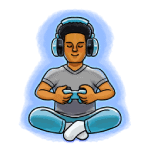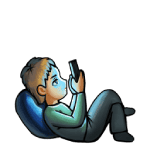The Healing Power of Sleep: Strengthening Immunity and Reducing Disease Risk
How Much Sleep Do We Actually Need?
While sleep requirements can vary based on individual needs, age, and health, for most adults, 7-9 hours is the golden range (Got kids, check out ‘Importance of Sleep for Children‘). It’s not just about quantity but quality as well!
Table of Contents
8 Hours in Bed ≠ 8 Hours of Sleep
Ever wondered why you feel groggy even after spending a solid 8 hours in bed? It’s because of the natural sleep cycle disruptions, periods of wakefulness, and various sleep stages. This means, sometimes, you might need a bit more than 8 hours in bed to get a full 8 hours of restful sleep.
For me, investing in a Smart Watch to monitor my sleep has been a game-changer. It’s worth the investment in your Health! ⌚💤🌙
Benefits of Consistent 7-9 Hours Sleep & Syncing with Our Circadian Rhythm:
🧠 Enhances cognitive function & creativity.
💪 Boosts immune system.
🌟 Reduces risks of chronic diseases.
🔄 Aids in muscle repair and growth.
💡 Improves mood & reduces stress.
🎯 Enhances concentration & productivity.
❤️ Lowers risk of heart disease.
🌿 Supports a well-functioning metabolism.
Remember, syncing with our natural circadian rhythm, or our internal body clock, aids in achieving quality sleep. It’s not just about the hours we lay down but ensuring those hours align with when our bodies are naturally ready to rest and rejuvenate.
Prioritize your sleep, folks! Your body, mind, and overall well-being will thank you. 😴✨
Read more on the Circadian Rhythm here.
Frequently Asked Questions about Sleep
How does sleep contribute to strengthening immunity?
Consistent sleep of 7-9 hours has been shown to boost the immune system. During sleep, the body produces infection-fighting substances like cytokines, which help combat foreign invaders such as viruses and bacteria, reducing the risk of infections and illnesses.
Can getting enough sleep reduce my risk of some diseases?
Yes, adequate sleep is linked to a reduced risk of some diseases. Sleep helps regulate stress hormones, maintain a healthy weight, and can lower the risk of health conditions such as heart disease, diabetes, and obesity.
Why don’t I feel rested even after 8 hours in bed?
Eight hours in bed does not equate to 8 hours of sleep due to sleep cycle disruptions, wakefulness periods, and the time it takes to fall asleep. To feel rested, you may need more than 8 hours in bed to complete enough cycles of restful sleep.
How important is sleep quality compared to sleep quantity?
Quality of sleep is as important as quantity. Quality sleep means going through all the sleep stages uninterrupted, which is essential for cognitive function, mood improvement, and overall health.
What role does syncing with our circadian rhythm play in sleep quality?
Aligning with our circadian rhythm, the body’s internal time-keeping system, is essential for obtaining quality sleep. This biological clock regulates the timing of periods when we are alert and when we feel sleepy over a 24-hour period, responding primarily to cycles of light and darkness in our environment. By living in harmony with these natural cues, we encourage our bodies to sleep during the darkest hours when melatonin, the sleep hormone, is highest, which is typically at night.
Quality sleep, in this context, means sleep that cycles through all stages, including the deep, restorative stages of non-REM sleep, without disruption. When our sleep-wake patterns are synchronized with the circadian rhythm, we optimize our chances of getting this restorative sleep because we are sleeping at the times when our body is best prepared for it.
In contrast, when we ignore these natural rhythms—by staying up late into the night, using bright electronic screens before bed, or sleeping in a room with poor darkness—our circadian rhythm can be thrown off. This misalignment can lead to difficulty falling asleep, fragmented sleep, or waking up feeling unrefreshed, even after a full night’s sleep.
Maintaining a regular sleep schedule, getting exposure to natural light during the day, and dimming lights in the evening can help keep our circadian rhythm on track. In doing so, we not only enhance the quality of our sleep but also support various other aspects of health that are regulated by the circadian rhythm, such as metabolism, immune function, and mental well-being. Prioritizing sleep according to our internal clock is thus a key component of a healthy lifestyle.
Is it worth investing in a Smart Watch to monitor sleep?
Investing in a Smart Watch for sleep monitoring could be a wise decision for those looking to enhance their sleep quality. These devices offer detailed analytics on your sleep, breaking down the time spent in various sleep stages and identifying any interruptions that could compromise the restfulness of your slumber. This data enables you to fine-tune your sleep habits and environment for optimal rest.
My experience with a Smart Watch has been transformative. It has made me more mindful of the actual rest I receive, not just the time spent in bed. With sleep tracking, I’ve gained a deeper understanding of how my body responds to different sleep schedules, which complements other health metrics I monitor like intermittent fasting and weight. This holistic approach to health tracking empowers me to make informed decisions about my lifestyle and well-being.
Author:
 | Lionel Thomas Father, Gamer and Founder with a Passion for Health, AI, Environment and Gamification of Life. |
Author Tool:
- ChatGPT (Content Enhancements & Research)
- Other Tools (AI)...
Artists:
References:
1. Lack of sleep: Can it make you sick?
Mayo Clinic
https://www.mayoclinic.org/diseases-cond...
Summary:
Lack of sleep can negatively impact your immune system, making you more susceptible to viruses like the common cold and slowing down your recovery if you become ill. While sleeping, your body produces cytokines that both promote sleep and help fight infection, but sleep deprivation can decrease the production of these vital proteins. Regularly not getting enough sleep can also raise the risk of obesity, diabetes, and cardiovascular diseases. The recommended amount of sleep for adults is 7-8 hours, for teenagers 9-10 hours, and for school-aged children 10 or more hours. However, exceeding 9-10 hours may actually lead to poor quality sleep for adults.2. Sleep and immune function
National Library of Medicine - National Institutes of Health
https://www.ncbi.nlm.nih.gov/pmc/article...
Summary:
Sleep and the circadian rhythm significantly influence immune functions. Studies indicate that during early night sleep, the body increases the production of naïve T cells and pro-inflammatory cytokines, while daytime wakefulness is associated with higher numbers of natural killer cells and anti-inflammatory cytokine activity. While separating the effects of sleep from circadian rhythms is challenging, evidence suggests that sleep enhances the movement of T cells to lymph nodes and boosts the interaction between antigen-presenting cells and T helper cells, particularly through interleukin-12. Sleep following vaccination has been shown to increase the number of antigen-specific Th cells and antibody levels, indicating that sleep plays a crucial role in developing immunological memory. This effect is particularly tied to slow-wave sleep and an endocrine environment conducive to immune function, characterized by high levels of growth hormone and prolactin, and low levels of cortisol and catecholamines.








 Snacks
Snacks Water
Water Eye Sight
Eye Sight Hearing
Hearing































